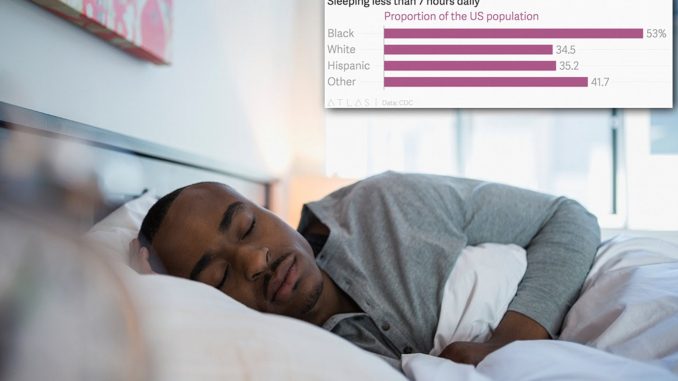
By Elliot Rosenberg and Michael Grandner
March 19 has been designated as World Sleep Day.
Sleep is a universal human need which connects us all. Yet, modern society has a complicated relationship with sleep health. While the idea of a “World Sleep Day” may conjure images of sleeping-in and siestas, if we may paraphrase Mark Antony’s famous eulogy in Shakespeare’s play Julius Caesar: “We come to rock the public, not rock it to sleep.”
Healthy sleep is recognized as one of the pillars of a healthy lifestyle. But what is healthy sleep health? Decades of research show that this means sleep of sufficient duration, adequate quality, and appropriate timing and regularity. It also means that sleep should feel restful enough to support alertness and performance the next day.
How much sleep should we get? The National Sleep Foundation in the US recommends 14-17 hours per day for infants 3 months and younger, 12-15 hours for infants over 3 months, 11-14 hours for toddlers, 10-13 hours for preschoolers, and 9-11 hours for school-age children. Adolescents should get 8-10 hours, adults should aim for 7-9 hours, and older adults should aim for 7-8 hours. Sometimes these goals are difficult to attain.
The key message of this year’s World Sleep Day is the importance of a regular and consistent healthy sleep schedule – not just not on Shabbat or holidays, but every day. This means getting up at a regular time, preferably followed by bright light exposure and some physical activity. It also means budgeting enough time at night to wind down from the day’s stress and activities to allow easy transition into sleep and knowing how to handle nighttime disturbances if you awaken in the middle of the night.
How does Israel fare when it comes to its citizens’ sleep behaviors?
In an Israeli Central Bureau of Statistics (ICBS) 2017 survey of 7,500 Israelis aged 20 and above, nearly half reported sleeping less than the recommended seven hours per 24 hour period. The difference between Jews and Arabs was striking: whereas more than 50% of Jews reported sleeping less than seven hours, only about 30% of the Arabs had such limited sleep.
ALSO READ: Biden sends Dems Senator Coons to Ethiopia amid Tigray crisis
While insufficient sleep is a worldwide phenomenon, Israel has one of the most egregious records, in the company of other sleep-deprived countries such as Japan, South Korea and Taiwan (Fleming S. 2019).
Does Israeli society pay a price in terms of the health, safety, and performance of its citizens? The aforementioned ICBS survey paints a troubling picture: Those sleeping less than seven hours were about 30% more likely to report poor health; this difference reached nearly 50% among those reporting less than six hours of sleep.
In addition, those reporting less than eight hours of sleep were more likely to report functional consequences, and risk increased as sleep decreased. For example, Israelis getting five or fewer hours of sleep were 277% more likely to experience drowsy driving, 116% more likely to experience problems functioning, and 267% more likely to experience daytime sleepiness. As other studies (Gottlieb DJ et al. 2018) document the risk of motor vehicle crashes attributable to insufficient sleep, it is clear from national data that suboptimal sleep in Israel is risking lives and increasing the burden of injury.
In economic terms, when the ICBS data is incorporated into the framework proposed in a recent RAND EUROPE report (Hafner M et al. 2016), this reveals a cost burden of more than NIS 4 billion, or roughly 1.2% of Israel’s GDP as a result of insufficient sleep.
To add additional perspective, sleep deprivation has a negative effect on the immune system. This includes reduced immune response to vaccination. As the world seeks herd immunity against COVID-19 through vaccination, the immunologic implications of Israel’s current sleep state raise concerns.
Given all of the above, what should Israel do to achieve good sleep health?
On an individual level, we recommend the adoption of the following principles:
• Avoid sleep insufficiency (“sleep debt”) by planning for a bedtime that considers age-appropriate sleep needs (and ensure adequate nap time for children). In this respect, planning one’s day beginning with the preceding night follows both Jewish and Islamic tradition of each new day beginning with the previous night;
• Promote regularity by keeping a consistent schedule both on weekdays and on Shabbat/holidays;
• Start your day out with a bit of sun exposure to reset your internal (circadian) clock;
• Exercise regularly! It helps deepen your sleep.
Employers should create a sleep-supportive culture at work:
• Avoid work intrusions such as meetings, emails, and calls before or after reasonable hours;
• Provide sleep health screening and training for all personnel;
• Invest in sleep-enhancing lifestyle interventions such as flexible time, physical activity facilities and rest/meditation areas, and provide protected time to use them;
• Consider providing incentives for employees engaging in recommended sleep practices.
On a national level, the government should provide funding for periodic national sleep surveys, develop and encourage national sleep health guidelines, adopt effective legislation to maintain work-life balance, and support evidence-based interventions to facilitate sleep behavior change.
We hope this World Sleep Day information provides a wake-up call for the Start-Up Nation!
• Elliot Rosenberg, MD MPH, School of Public Health University of Haifa.
• Michael Grandner, PhD, MTR Sleep and Health Research Program University of Arizona.




